Next Article
Eight Views of Worlds
A reflection on the emotional grind that is Worlds
1. AGAIN & AGAIN
Here are some truths about World Championships in League of Legends:
One. The first was held at DreamHack Sweden in 2011. It was not in Phreak’s basement, but rather at the Elmia Exhibition and Convention Centre in Jonkoping. “Worlds” is a funny word for a tournament with only four regions, only two of which exist today in the same form, and “championship” is a funny title for a tournament that wasn’t even the biggest on the scene. But it was still a Riot-organized tournament, and still we call it Worlds.
Two. There are only two players who were at Worlds 2011 who are still playing professionally. They are both at this year’s Worlds. One of them is sOAZ. The other is Doublelift.
Three. In the eight years in which Riot has held a World Championship, an NA team has yet to bring home a title.
Four. Which means, of course, that for all eight years in which Doublelift has been playing professionally, he has never won Worlds.
When you are a fan of an NA LCS team at Worlds, your journey is the five stages of grief, but backwards: first, acceptance that they will never win, and eventually, denial that this is all they will achieve. These steps are not stations along a subway line of emotions, but rather a cycle doubling back on itself each year. So we might believe that TSM would have made it out of Groups in 2016, only to make peace with the reality that they did not. We might believe that Cloud9 with their rookies would not make it out of Groups this year, only to be proven very, very wrong.
We might, for a little while, believe that Team Liquid can make it across the finish line, even when we know better.
TL played through Groups so timidly it was like they were holding their breaths, like this was all a dress rehearsal and they were waiting for a sign to tell them that the real Worlds had begun. And when that sign came, it was, of course, in the form of defeat: KT Rolster losing to Edward Gaming and leaving TL without a way to advance to Quarterfinals. Finally, they were set free. And finally, they won against EDG.
To be a fan is to be resurrected time and time again in faith. I think of that final TL match as a prayer, one that all NA LCS fans know well: see what we could have done, if we had been given just one more chance. You hear it as Doublelift takes his headset off, a small wry smile on his face as EDG’s Nexus falls: we can be strong, as strong as anyone, stronger even. He gets up and hugs Olleh, sad and slow: so believe in us one more time, for one more game.The rest of the team envelops Doublelift, and he puts his arms around his teammates, and for a brief second they bow their heads.
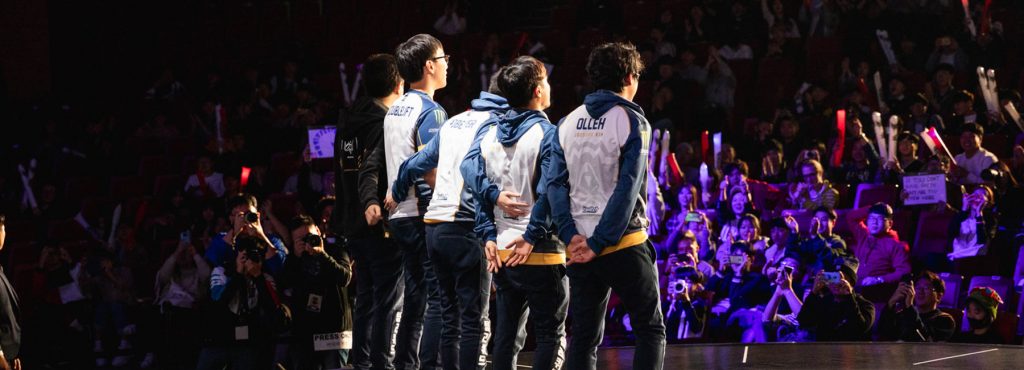
2. THE MOST BEAUTIFUL MOMENT IN LIFE
In 2012, the Taipei Assassins came in like a storm, sweeping the local Garena competition in multiple events before storming their way through Worlds. And, like a hundred-year storm, once they left, they never came back. They would never go on to achieve such great heights ever again. They didn’t even make it back to Worlds in 2013. But for a moment, they were the best team in the world.
Hindsight loves to downplay the teams that have one brilliant moment only to disappear. It says TPA weren’t really that good, they were dependent on the meta, look at how they were murdered by Moscow 5 at IEM a few months later. Or last year’s Misfits, yeah sure they took SK Telecom to five games, but SKT was in historically poor form—did it mean anything at all?
And maybe all those things are true. But what is also true is how we felt at those moments. I can only imagine how it must have felt to see TPA on every local newspaper and TV channel after they returned victorious from Los Angeles in 2012, but I can tell you how it felt last year watching MSF play against SKT. I was on my honeymoon in Hong Kong, and we were in a hotel room so small it was basically just a bed. From the bathroom windows, you could almost see Lan Kwai Fong, a small cluster of noisy bars and clubs, the hottest night spot in Central. But the only thing that mattered to me that afternoon was ten young men playing a video game just a few hours train ride away in Guangzhou. The only thing I could think about was the possibility, however small, of MSF going the distance.
I never expected to feel that way again. And then Vitality played Gen.G on the first day of the Group Stage.
Later, we would all realize this Worlds belonged to the underdog and it was being the favorite that was dangerous. The mighty LCK would drop team by team. Gen.G was just the first. But when VIT took the stage to play against Gen.G for the first time, we didn’t know that Gen.G would finish with a 1-5 record, that no LCK team would make it past Quarterfinals. G2 had beat Afreeca Freecs just two hours earlier, but they were the old kings of Europe. Maybe it was a fluke. Certainly no one expected VIT, with three players who at this time last year were still playing in promotions, to take down last year’s World Champion.
VIT didn’t turn out to be the next TPA. They didn’t even make it as far as MSF, who at least got the chance to play in the Quarterfinals. But like the joyful, fist-pumping TPA that won the hearts of the world in 2012, and like the 2017 “straight outta Challengers” MSF with the out-of-meta Leona pick, there was a moment when all the world’s eyes were on VIT. It felt like Jiizuke on Ekko, juking and dodging and stunning up Cuvee in the Gen.G base, had shattered this timeline. Untargetable, invulnerable, he made the world all his own, and we had front-row seats to watch it happen.
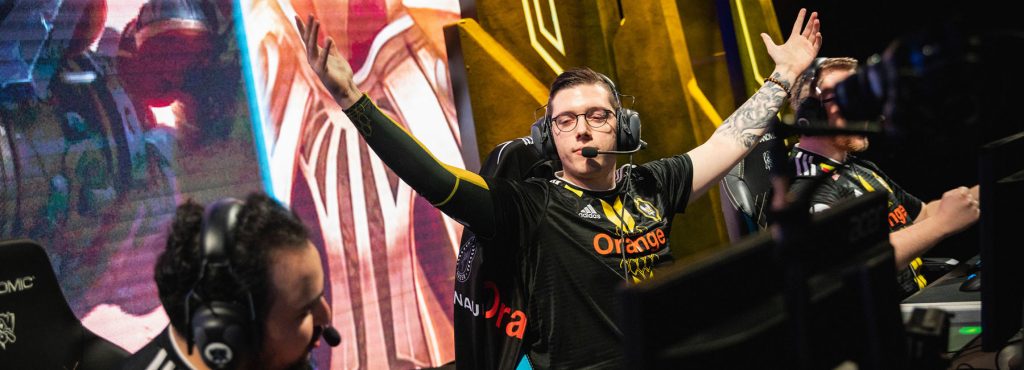
3. INTO THE NEW WORLD
Nature abhors a vacuum. So, too, do esport narratives. Without SKT this year, we grabbed onto the next best thing, and that was and may always be Uzi. Uzi could be a world champion if not for SKT’s royal road. Uzi could be the most talented and most famous player to have ever touched League of Legends if not for Faker. Uzi the second place finisher. Uzi the uncrowned king.
2018 was supposed to finally be Uzi’s year: he captured the spring and summer split titles, MSI, and even a win for China at the Asia Games. He was supposed to usher in a new generation of LPL dominance. And that may happen — but not by him. Never mind that RNG didn’t stomp through Group B the way we expected, dropping games to VIT and C9. Never mind that Uzi even during the first day of groups talked about being nervous with all the pressure of being the “final boss.”
Why are we so eager to find the next dynasty? Maybe this was the original sin of SKT, who made us believe in dominance that may never again be replicated. We don’t want our winners to be merely strong or merely better at the game than their opponent. We expect all our winning teams to be superhuman gods descending from the Mount Olympus of League of Legends. Was Uzi always meant to be a demigod felled by his hubris? Or is it that after three years of SKT, this was the only way we knew how to tell a hero’s journey?
A part of me mourns for the future that RNG had promised: a new dynasty with Uzi sat upon the throne. But if RNG gave us anything with their defeat, it was a chance at something new. When they fell to G2, they ushered us into a world with no gods, no kings, and no favorites. A new world full of uncertainty — open for anyone’s taking.
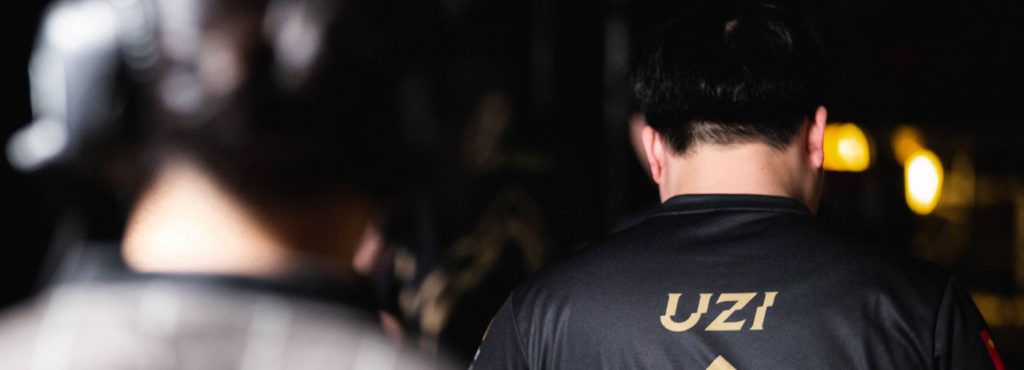
4. BECAUSE OF YOU
On the blue side, we have Afreeca Freecs. In 2018, they booted their top laner for a 19-year-old nobody from Challengers Korea, added four players (mostly rookies), almost won the Spring Split, and finally made it to Worlds. No one knew when they entered that they would be Korea’s last hope or that they would lose to C9 to give Korea its worst finish ever at Worlds.
And on the red (or rather, sky blue) side, we have Cloud9. In 2018, they booted both of their top laners for a 21-year-old nobody from the Challengers Series, added four players from their academy team, and climbed from tenth place to winning the gauntlet. It was a joke everyone liked to tell—that C9 was the NA LCS’ only hope. It wasn’t until they beat AFS, giving North America its best finish in the entire history of Worlds, that we realized how true that joke really was.
The Korean sister team officially died in 2014, but its spirit lives on in fits and bursts in NA and Korea both. AFS coach iloveoov has been talking about it as far back as March 2017, telling Inven that he wanted “a constant and repetitive practice with double squads, consisting of at least 10 players and 3 or 4 backups for each team.” And though C9 was more of a seven-man squad with subs in the jungle and mid lane, Jack Etienne as late as September told ESPN’s Emily Rand that the players “really saw themselves as a 10-man squad.” The academy team was an integral part of C9—a place where players could “reset and come back stronger.”
You know that old adage about how it takes a village to raise a child. Though only five men from AFS and C9 were on the stage at any one time, each time they were carrying the hopes and dreams of many more. After AFS won against Kingzone in the LCK Regional Playoffs, its three coaches and five subs came flooding into the booth. Spirit and Mowgli embraced, while Aiming contentedly planted himself in TusiN’s lap. I thought of it when C9 won against AFS in Quarterfinals more than two months later. It wasn’t quite thirteen people, but there in the huddle were Goldenglue and Blaber, the latter rocking a backwards C9 snapback. They couldn’t go with the others across the stage to shake hands, but Goldenglue held onto Svenskeren for as long as he could. Rubbed his shoulders, grinning, as if to say I’ve got your back.
5. REPLAY
In the words of Mark Twain, “History doesn’t repeat itself. It rhymes.” When Fnatic and Edward Gaming were chosen to face each other once more in the Quarterfinals, it felt like the beginning—or the end—of an epic poem.
As Kelsey Moser wrote on the eve of Quarterfinals, the similarities between 2015 and 2018 are eerie. In 2015 EDG won the very first MSI by beating the LCK representatives SKT; in 2018, it would be RNG and Kingzone. In 2015, Fnatic left Group B as its first seed, after soundly beating Rookie and Invictus Gaming; in 2018, Fnatic would do the same, though IG would advance as the group’s second seed. In 2015, FNC and EDG faced off to see who would advance to the Semifinals, and FNC swept EDG 3-0.
In 2018, they would meet again, and FNC would win again, 3-1.
The human brain is molded by pattern recognition. We mistake it in machines for intelligence, just like we mistake a line drawn between two dots to be meaning. Symmetry is the most basic sleight of hand in a writer’s bag of tricks, a way we fake meaning to get you to keep reading. So it’s tempting for me to tell you that we should have seen it coming. FNC was always going to stomp EDG at Quarterfinals. After all, it’s all happened before.
But what symmetry doesn’t tell you is how much professional League of Legends has changed since 2015. No one would ever say that in 2015 League of Legends was still a newcomer. 2014 was its coming out party; 2015 just cemented its place in the esports scene. But in 2018, League of Legends has had to do something much harder than just show up: it’s had to mature. Franchising, the first generation retiring, players becoming coaches, new sponsors and millions of dollars in investment—it’s still learning how to make sense of it all, how to go from an interesting endeavor into an establishment.
And what symmetry can’t quite capture is how much EDG and FNC have had to grow along with the scene. The EDG and FNC that faced off in 2015 are no more. In 2015 Meiko was the youngest on his team, a substitute support suddenly playing his first real LPL game, untested. In 2018, Meiko is the EDG starter with the longest tenure on the team, a star in his own right, trying to shepherd a young EDG roster as it casts off the stars like Aaron and Clearlove who brought EDG into being. In 2015 Rekkles was fresh off his rumspringa on Alliance and Elements, trying to prove that Fnatic hadn’t made a mistake taking him back. In 2018, Alliance and Elements have long since dissolved, and Rekkles is the elder statesman of Fnatic, its face and its brand, placed on the bench if only to usher in new talent like Bwipo.
Symmetry is a coincidence, not a curse. There was nothing predetermined about FNC’s success or EDG’s loss. This year’s quarterfinals was a reflection of three years of change, three years of doubt, three years of fine-tuning and nurturing and refining, three years of hard work. EDG vs. FNC is a testament to how much we all can change. Maybe, if you’re FNC, 2018 is the chance to show how much you have changed for the better. And maybe, if you’re EDG, 2018 is a sign that there is still so much more you can do, so much better that you can become.
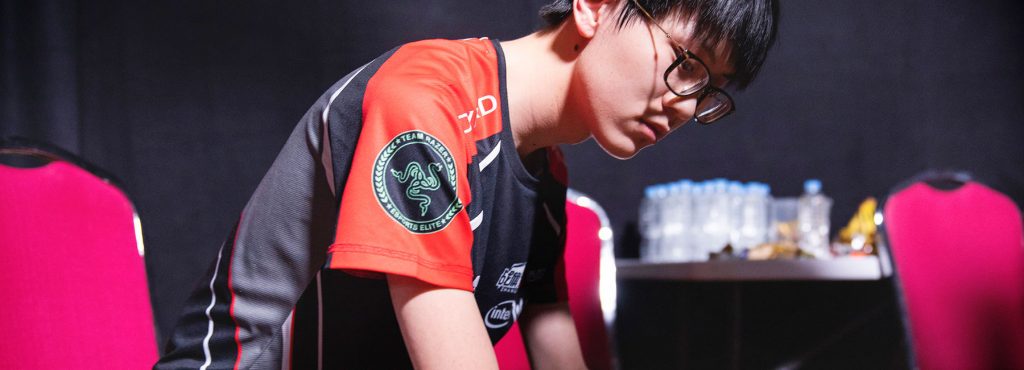
6. ECLIPSE
In sports, we love the effortless players, the ones that make a caster croon, he makes it look so easy. We love the aggressive junglers, the carry top laners, the mid lane duel, the ADC caught out in a sideline who suddenly reverses a 1v2, and the play-making support with a nifty hook. It’s hard to love the team with a good draft, the ward in the right place, the mid laner on Malzahar. It’s hard to love the team that quietly does its job.
Maybe that’s why it has been so hard for people to love Gen.G. From a group of scrappy Solo Queue players almost relegated in 2015 to the World Champions that struggled on their home turf through all of 2018, they’ve worked hard every step of the way. Yet still they are only our almost-ran team, always sidelined for something flashier. We remember the ROX vs. SKT Semifinals in 2016, not the full Best-of-5 Finals between SKT and Samsung Galaxy; Faker crying in his chair and not Ambition finally lifting the Summoner’s Cup. If we remember Crown at all, it is mostly negative: his frustrated face as he storms off the stage in 2016, or him sobbing uncontrollably at his computer after losing to Kingzone Dragon X in the spring.
For every rookie VIT team popping off, there is a Gen.G dynasty falling away, and they crossed paths for one perfect and terrible game on Day 5 of the Group Stage. At around 33 minutes, VIT picked off Crown and Cuvee in the mid lane, leaving the rest of Gen.G scattered. “I think [for] Europe, it was always about this ‘chase,’ catching up to Korea,” VIT Coach YamatoCannon would say later in a stirring post-game interview. And if you could have brought that chase to life, it might look like this one: Ambition and CoreJJ fleeing into the top-side red jungle and VIT running after them like a pack of bloodhounds catching the scent. It’s Attila that sees the chance to end it all. He snipes down CoreJJ, then sets his sights on Ambition.
He is on Tristana, and his jump forward is effortless.
Less then a minute later, Gen.G’s chances at advancing crumble with their Nexus.
It is hard to love something that is not easy, and League of Legends has never been easy for Gen.G. They’ve had to make the hard climb up the unyielding mountain face, struggling through depression and meta changes and roster decisions as they try to reach the top. I cannot imagine how hard the journey has been for them, how much it would have broken me down, how many more times than Crown I would have cried. As VIT took a bow, Crown walked off, snapping his jacket just a little. I imagine him fading into the fog that fills the stage, fading out of view—as if he is drowning, the effort he put in to get this far weighing him down like an anchor. There are no easy words of comfort to give him, and there is nothing waiting for him but more hard work and pain. Because sometimes the things we love are effortless. But sometimes, love is just hard.
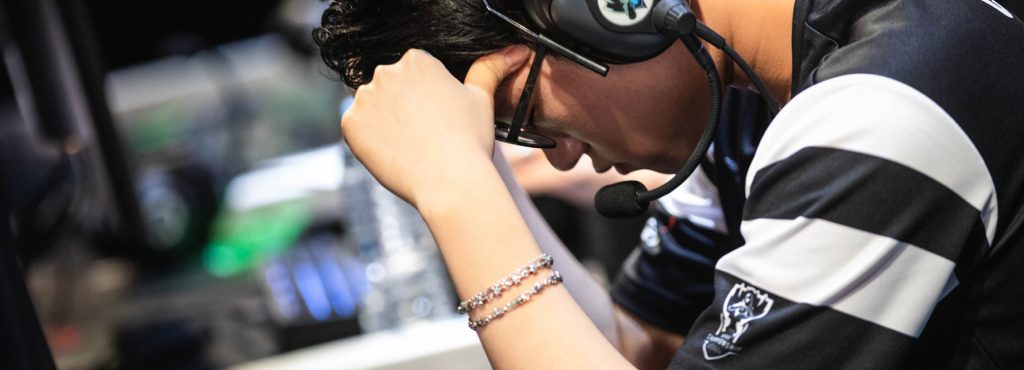
7. STILL ALIVE
There is always one LMS team that makes your heart race, that makes you think this could be the one. If TPA was the unexpected meet-cute that swept you off your feet, then ahq is that beautiful first date that never quite delivered on its promise. In 2015, we dumped ahq for Flash Wolves, the most eligible bachelor around. And for the last three years, we’ve gone steady. FW have been good to us with Semifinals finishes in every MSI, the IEM Katowice performance in 2017, dominance in the LMS split after split. But at some point, the relationship became stale. At some point, we started to settle for each other.
In 2017, the new Worlds format gave the LMS three seeds, and Hong Kong Attitude rose to the occasion, then immediately fell on its face. Thanks to a dominant showing by G-Rex in the Play-in Stage, all three of the LMS’ seeds made it to the Group Stage this year. But the high of that performance faded in the days following. FW gave themselves a disappointing third-place finish in their group, and both MAD Team and GRX finished 0-6—the worst ever for any LMS team at Worlds.
By now, surely you’ve noticed how many of these moments I have picked are of loss. I am afraid that by carrying on this way, I am making you think there are only two things in League of Legends—victory or agonizing defeat. What team doesn’t want to win? What team isn’t sad when they lose? But at the end of Worlds, there is only one winner. Everyone else has to lose.
So let me catalog something about loss that is not suffering. Let me say instead that this is a transition time for LMS. That FW are learning how to play without Karsa, that MAD is learning how to step out of ahq’s shadow, and that this is G-Rex’s first year in the LMS after acquiring most of the Raise Gaming roster, who incidentally never made it to Worlds. Let me point to the first game EDG played against MAD, those moments where K’s Rakan had me on the edge of my seat and made me think that this team had a chance—if not this year, then next. Let me reminisce on how hard Empt2y has worked, giving out interviews in English like candy and sending out love calls to the NA LCS as if to say pick me, pick me, pick me up.
I don’t think GRX or MAD came to Worlds believing they would win. For GRX, even making it into Groups was a pleasant outcome. But if LMS has taught me anything, it’s that FW isn’t our forever. There will come a day when the LMS torch will pass on from them too. And who knows, maybe what we’re really missing is a LMS team who started at the bottom. Maybe GRX or MAD can teach us a thing or two about earning our love.
In the video, Evi is a black shadow, indistinguishable from his surroundings. The screens of the new LoL Park arena glow behind him — images of the Summoner’s Cup like a holy grail suspended in blue and silver. Though you can’t see his face, the way he swings his phone in a wide arc around him, trying to capture as much of the arena as possible, is instantly recognizable: awe and excitement and nostalgia already for DFM’s victory over KaBUM, which was at the time just hours old.
“A Look Back to Move Forward” — this is the title of a Lolesports video of Piglet (then on Team Liquid) and Impact (then on Impulse) revisiting the Staples Center. In the video, Piglet and Impact walk shoulder-to-shoulder through the empty arena, commenting on how much smaller it looks without all the people. They squint at the stage from the stadium seating, the ghosts of the players they used to be two years ago, and the ghosts of the audience watching their younger selves play. They raise their arms up in the air, a little mockingly, as the footage cuts to 2013 Bengi and Faker in the same position right after their win.
Impact has always been forward-looking, the kind of person perpetually planning for the end. In 2014, when he was still on SKT, he sent a message to his future self, matter-of-factly noting that in ten years, his pro-gaming career would be over. He hoped that by the grand “old” age of 30, he’d be studying English, finished with a world tour, become a DJ, and gotten a tattoo. Even in 2013, he was already looking towards the end. “For me, I was thinking it could be my last time playing in a place like this,” he tells Piglet.
He’s been right so far — 2013 was the last time he played in the Staples Center. It’s Piglet who’s prone to getting lost in the game, who looks backwards, who sounds the most wistful. “T1,” he muses, looking at where he had struck the infamous pose, with one finger raised in the air. “That’s all a dream now.”
The best and cruelest thing about time is its forward progression: tomorrow will always come, and you can never stop it from coming. So, Janus-like, we are at every second being split in two: always leaving behind the past and being left behind by the future. Even if Evi didn’t know it, when he stood in that empty arena taking it all in one last time, he was channeling the likes of Piglet and Impact, looking backwards to make sense of how to move on. I think of him peering out on the darkened stage, imagining what it would have been like to be in the audience, watching himself celebrate DFM’s first time getting to the Play-in Knockout Stage. Maybe he was seeing himself in two or three or ten years in the future coming back to reminisce about this moment. Maybe he thought of how DFM, too, had been around for almost seven years, how his teammate Ceros had been there for all of them. Maybe he dreamed for just an instant about the next stage, if DFM could make it. And maybe, at the same time, he wondered how much longer he would have in this career.
Or maybe he was just thinking about how late it was. Past midnight, everything shutting down. Time to go back to his hotel and go to sleep. Then wake up tomorrow, boot up the computer, load up the client, and play some League of Legends. Maybe he might even win some games. And in a little while, there would be a tournament. And win or lose there would be another one. And more games, and more tournaments, and on and on. As it has been for eight years. As it will be, we pray, for more.
